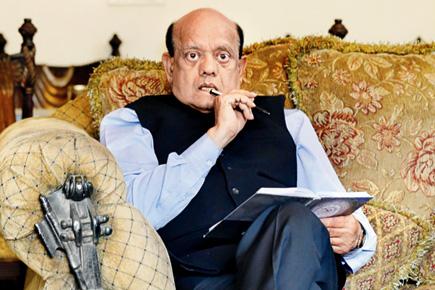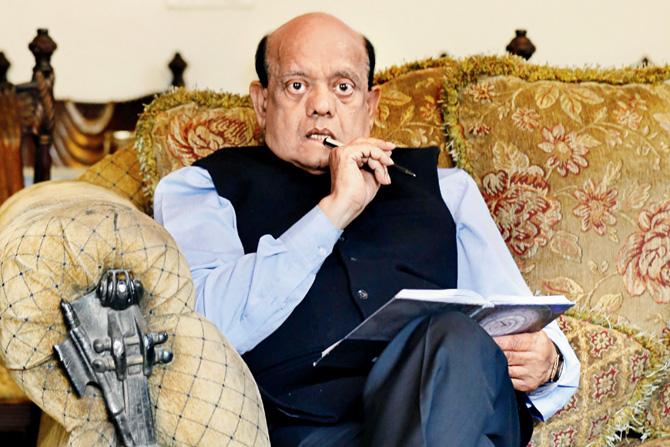India's original stand-up comedian Surendra Sharma, who's ready with a new collection of humour poetry, feels that Kapil Sharma needs three-four people to help him make people laugh

Poet Surendra Sharma
 Hasya Kavi Sammelans at one time in Indian literary history, were as eagerly anticipated as the weekly Sunday episodes of Ramayana on the national broadcaster’s TV channel. They were events where poets gathered to make people laugh and think — about society, politics and even their spouses.
Hasya Kavi Sammelans at one time in Indian literary history, were as eagerly anticipated as the weekly Sunday episodes of Ramayana on the national broadcaster’s TV channel. They were events where poets gathered to make people laugh and think — about society, politics and even their spouses.
ADVERTISEMENT
Hindi satire had enough seats reserved in village halls, and town auditoria, and eyeballs with the arrival of TV, their popularity helped on by Doordarshan. But the onslaught of cable media meant people had more to choose from and brands of Hindi satire lost their following, and their audience shrank and sank deeper into a television daze.

Poet Surendra Sharma
The north Indian Hindi-speaking belt of Bihar, Uttar Pradesh, Madhya Pradesh, Rajasthan, even Haryana and Delhi, is a vast catchment area where satirical poets — such as Surendra Sharma, the deadpan owl-faced comedian — still enjoy an audience. Sharma’s famous opening set line was chaar linaa suna riya hoon, followed by Ghar-aali kah rahi thi — “where he makes fun of his boring, fat, p****ed-off, or stupid wife” as a young stand-up, whose father was a patron of these shows in his tier-2 hometown in the 1980s, puts it. But he has written sharp, progressive satire too. Here is an example:
‘Koi farak nahin padta/Iss desh mein raja/Ram ho ya Raavan/Janta toh bichaari Sita hai/Raavan Raja hoga toh utha li jaayegi/Ram Raja hoga toh ghar se nikaali jaayegi.’
At his Civil Lines home in Delhi, Sharma — who is slated to perform in Mumbai this week — is sitting snug in his sink-in sofas dressed like a corporate exec in a blue shirt and black trousers. There is even a suitcase on the coffee table before him to complete the picture. He gives instructions to a bemused-looking orderly for the transfer of an elderly relative, and to a kitchen help, for tea.
“Doodh logi?” Pause. “Dilli waali chai?...” then an arch, “kya Punjabi ho? Kya ho?”
Then: “Pay Commission ke hisaab se dete hain naukri?”
But, soon we settle into a more serious Q&A.
Q. When did you start writing? What was it like to perform at that time?
A. I started in 1966 when in college, but, professionally since the 1970s. The crowds used to be bigger. Some 40,000 to 50,000 people would come from 100-150 km away. And the sessions would carry on until 5-6 am. Jaipur always had the largest audiences. Sometimes, up to a lakh. Ram Niwas Bagh would have people spilling out of the gates and there were speakers mounted outside, so that people could sit and listen in their cars. There were mounted police too… the works.
There was not much TV then, you see. I did appear on Delhi DD — there was only one channel at the time. So, to appear on one channel meant you appeared in front of everyone across the whole country. Now, there are hundreds of channels and I haven’t ever met one person who has watched a television channel for a whole half hour without switching.
Q. Do you watch much TV now?
A. Not much. But these days, I’ve been watching Zindagi in which Pakistani actors deliver quite subtle performances. They don’t go to bed with all their jewellery on, unlike our shows, where artists keep all their jewellery on all the time. The Pakistanis potray a reality closer to ordinary life.
Q. What is your comedy/poetry mainly about?
A. A lot of my shows are about politics, family, my wife — what worked in the old days.
Q. Your best known stuff is the comic content. Does it bother you that your other work is ignored?
A. First of all, it doesn’t matter if I write something serious or comic — there will never be any vulgarity or double meaning in it. And, I will never ever say anything that is divisive (politically or socially).
Q. You are a member of the Censor Board. Do you strongly disapprove of vulgarity?
A. Kamai nahi ho to nange raho, nangepan ki kamaai mat karo... We can be naked if we are poor but we shouldn’t strip for money. Culture ke kapde utarne se TRP badhate hain. Ramayan jab aati thi, us se badi TRP hai kisi ki? (Don’t strip culture. In Ramayan nobody stripped, but can any show match its TRPs?)
Q. Tell me about the politics in your comedy.
A. I talk about Modi’s thinking. My question is not whether Modiji will get us a bullet train, my question is how is it that a man goes from a village to Mumbai on top of the roof, ducked under a high-voltage cable. The priority should be getting the passenger inside the train. Don’t give me wheat for R2. Make me able enough to buy it for R10. I’m against schemes like MGNREGA.
At first there was the population problem. But ever since Sanjay Gandhi lost one election, no political party wants to touch that issue.
Q. How do you prepare for shows?
A. I don’t. I don’t think until I am at the mic. What the quality of the audience is then the first thing I think of while at the mic. What its IQ is. Content may vary as per size of the audience. If there are hundreds of people, I’d use content that a coolie or a collector could listen to. But, something more literary for smaller audiences.
Q. What do you think of Kapil Sharma’s comedy?
A. There’s only one problem with him. He can’t make anyone laugh on his own. He needs three-four people to help him.
 Subscribe today by clicking the link and stay updated with the latest news!" Click here!
Subscribe today by clicking the link and stay updated with the latest news!" Click here!






